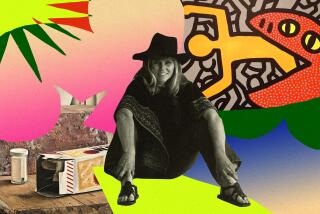The Picassos that Pablo liked best
- Share via
MADRID -- They were Picasso’s own favorites and this is the first time -- and possibly the last -- they will leave Paris together.
Making the most of refurbishing work at the Picasso Museum in Paris, Madrid’s Reina Sofia art museum has brought together what are considered to be the Spanish artist’s own favorites and the monumental “Guernica” in a breathtaking 400-piece show to run until May 5. “It’s a show of Picasso’s Picassos,” said Reina Sofia’s new director, Manuel Borja-Villel. “They’re the Picassos he always kept himself.”
In return, Spain has agreed to pay a whopping $5.1 million to help fund the restoration work at the Paris Picasso Museum, which has been partly closed since December. The restoration is expected to cost about $35 million.
But for the Reina Sofia director, the price was worth it.
“It’s a unique opportunity,” Borja-Villel said. “It’s never been done before, and it probably won’t be done again.”
The show includes 350 of the most-prized works from the Paris museum, including many pieces rarely put on display even in the French capital, according to Borja-Villel. A smaller version of the show will go to Australia, Canada, Finland, Japan, Russia, the United Arab Emirates and the United States.
“I have a feeling that this experience, so necessary, will never be repeated,” said show curator and director of the French museum, Ana Baldassari. “For that reason, we can state that this is a historic moment.”
The Madrid exposition is split chronologically into four sections, with plenty of samples of the tens of thousands of paintings, sculptures, drawings, engravings and ceramics that Picasso produced between the end of the 19th century and his death in 1973.
“The 20th century was Picasso, and after him it was necessary to start painting from zero again,” Borja-Villel said.
Pablo Picasso, considered the father of Modern art, was born in 1881 in Malaga, in southern Spain, but spent most of his life in France. The Spanish Civil War, from 1936 to ‘39, and the following nearly four decades of dictatorship kept him from returning to his native country.
Paintings such as the “The Death of Casagemas,” the blue “Self-Portrait” and “La Celestina” dominate the first section covering Picasso’s genesis period of 1895 to 1924. The surrealist second section, spanning 1925 to 1935, features “The Kiss,” “The Artist and His Model” and “The Acrobat.”
The show’s axis is the Reina Sofia’s emblematic antiwar opus, “Guernica,” and its preparatory works. The period of 1935 to ‘51, in which Picasso expresses his pacifist political leanings, also includes “A Woman Crying” and “Massacre in Korea.”
A final section covers Picasso’s postwar period -- 1947 to 1972 -- with the artist exhibiting a freer and more relaxed style, producing such delights as “Jacqueline With Crossed Hands” and “Dejeuner sur l’herbe, After Manet.”
“If anyone wants to see what Picasso kept for himself, what he loved most, what he felt about his art, what painting meant for him, I think this is the show to see,” Borja-Villel said.
More to Read
Sign up for The Wild
We’ll help you find the best places to hike, bike and run, as well as the perfect silent spots for meditation and yoga.
You may occasionally receive promotional content from the Los Angeles Times.






